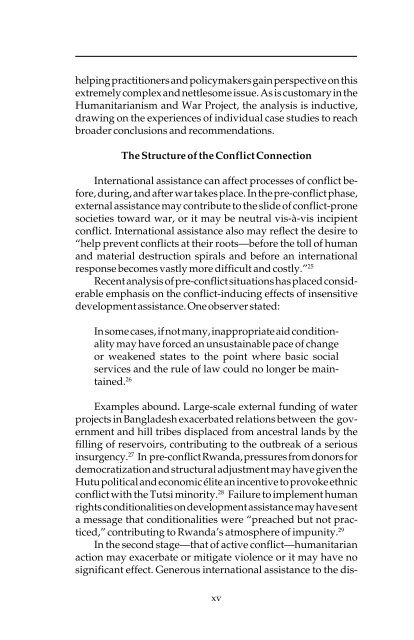Brown Cover OP 43 - The Watson Institute for International Studies
Brown Cover OP 43 - The Watson Institute for International Studies
Brown Cover OP 43 - The Watson Institute for International Studies
You also want an ePaper? Increase the reach of your titles
YUMPU automatically turns print PDFs into web optimized ePapers that Google loves.
helping practitioners and policymakers gain perspective on this<br />
extremely complex and nettlesome issue. As is customary in the<br />
Humanitarianism and War Project, the analysis is inductive,<br />
drawing on the experiences of individual case studies to reach<br />
broader conclusions and recommendations.<br />
<strong>The</strong> Structure of the Conflict Connection<br />
<strong>International</strong> assistance can affect processes of conflict be<strong>for</strong>e,<br />
during, and after war takes place. In the pre-conflict phase,<br />
external assistance may contribute to the slide of conflict-prone<br />
societies toward war, or it may be neutral vis-à-vis incipient<br />
conflict. <strong>International</strong> assistance also may reflect the desire to<br />
“help prevent conflicts at their roots—be<strong>for</strong>e the toll of human<br />
and material destruction spirals and be<strong>for</strong>e an international<br />
response becomes vastly more difficult and costly.” 25<br />
Recent analysis of pre-conflict situations has placed considerable<br />
emphasis on the conflict-inducing effects of insensitive<br />
development assistance. One observer stated:<br />
In some cases, if not many, inappropriate aid conditionality<br />
may have <strong>for</strong>ced an unsustainable pace of change<br />
or weakened states to the point where basic social<br />
services and the rule of law could no longer be maintained.<br />
26<br />
Examples abound. Large-scale external funding of water<br />
projects in Bangladesh exacerbated relations between the government<br />
and hill tribes displaced from ancestral lands by the<br />
filling of reservoirs, contributing to the outbreak of a serious<br />
insurgency. 27 In pre-conflict Rwanda, pressures from donors <strong>for</strong><br />
democratization and structural adjustment may have given the<br />
Hutu political and economic élite an incentive to provoke ethnic<br />
conflict with the Tutsi minority. 28 Failure to implement human<br />
rights conditionalities on development assistance may have sent<br />
a message that conditionalities were “preached but not practiced,”<br />
contributing to Rwanda’s atmosphere of impunity. 29<br />
In the second stage—that of active conflict—humanitarian<br />
action may exacerbate or mitigate violence or it may have no<br />
significant effect. Generous international assistance to the disxv

















